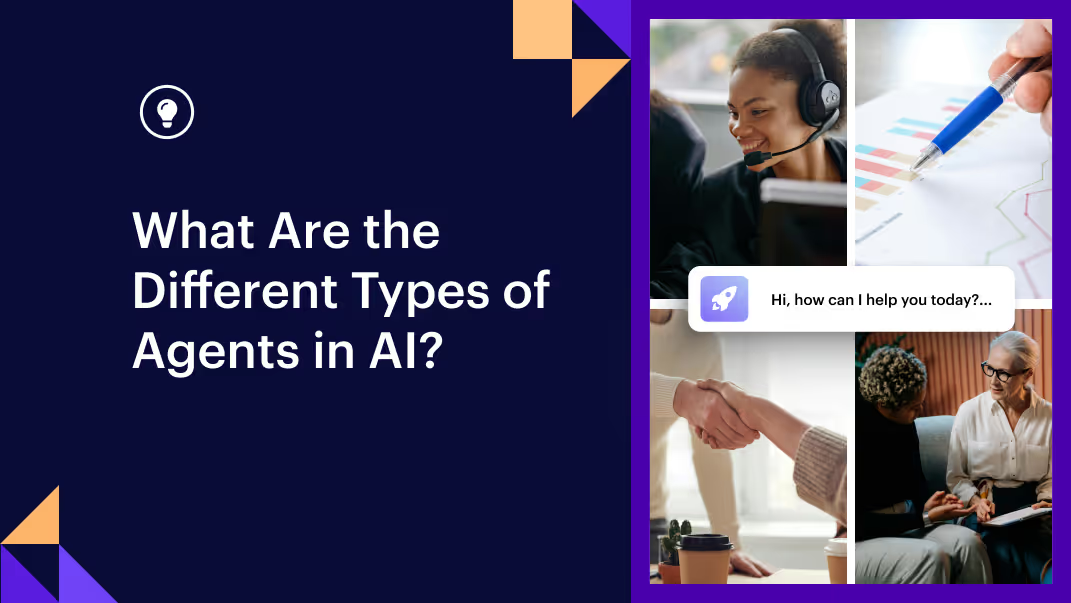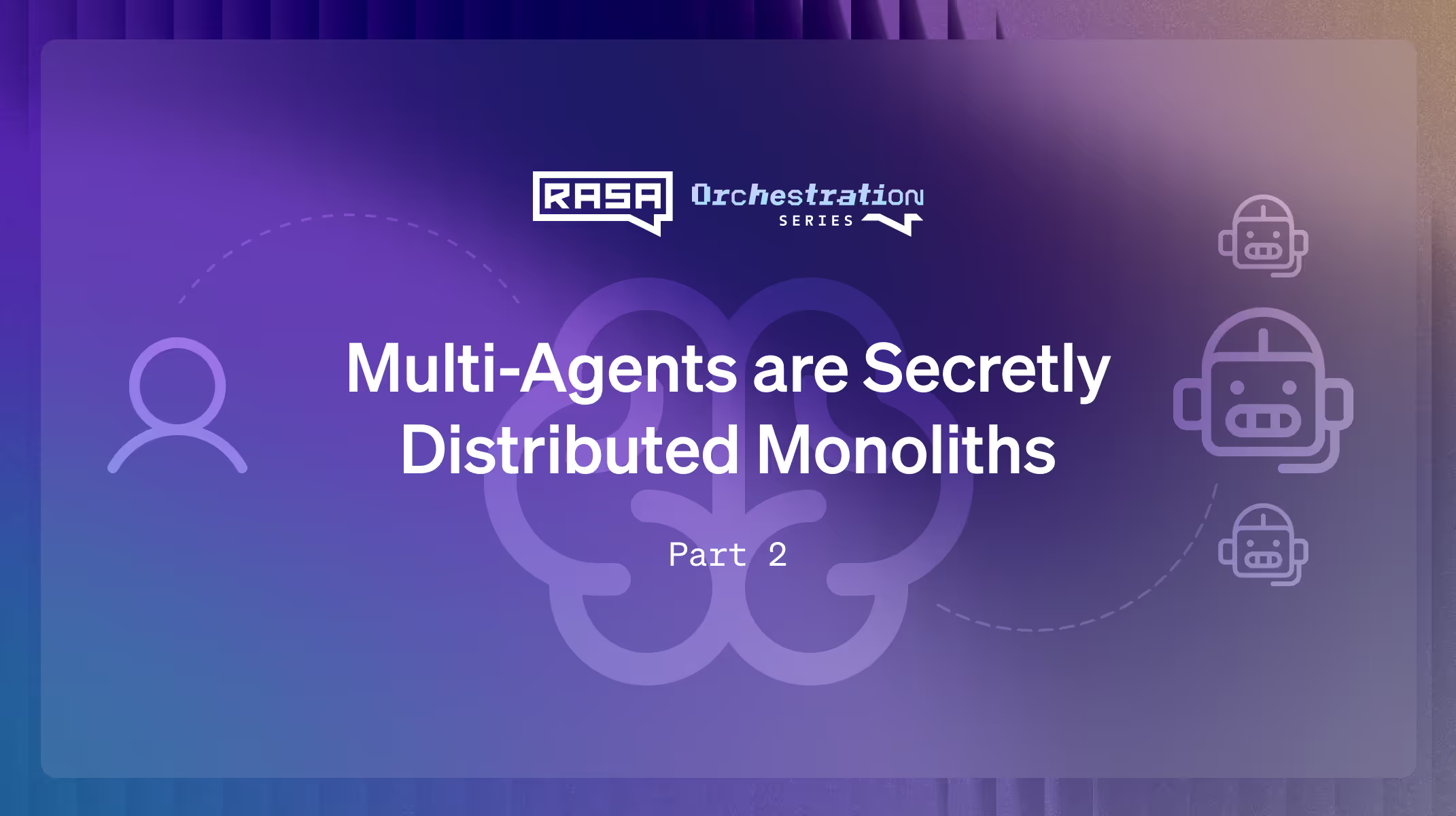AI optimizes business operations by automating tasks, streamlining workflows, and enhancing customer interactions. At the core of this transformation are AI agents-systems that reduce the need for manual intervention while delivering faster, more consistent results. Whether handling routine inquiries or assisting with complex decision-making, AI agents help enterprises operate more efficiently.
However, not all AI agents function the same way. Some operate based on predefined rules, while others dynamically adjust their responses using data-driven insights. Understanding these differences helps businesses select solutions that align with their operational needs and performance expectations.
The term AI agent is often used broadly, covering everything from simple rule-based systems to adaptive models with varying decision-making capabilities. While flexibility matters, Rasa focuses on structured, reliable, and proactive AI assistants. Instead of open-ended, unpredictable systems, Rasa’s approach ensures AI agents remain cost-effective, scalable, and transparent while dynamically guiding conversations within clear business logic.
This blog will introduce the different types of AI agents and explain their roles in automating tasks, improving decision-making, and enhancing customer engagement. We’ll highlight how businesses can adopt structured, agentic AI that maintains control while offering dynamic, proactive interactions where needed.
👉 Want to dive deeper into responsible AI agent design? Check out our blog on How to Spot 'Prompt and Pray' in Disguise.

What Are AI Agents?
AI agents are software systems that combine artificial intelligence with defined business logic to execute tasks. These systems go beyond traditional tools by automating workflows, analyzing data, and delivering actionable outcomes. Unlike rigid software programs, AI agents respond dynamically to inputs, ensuring reliable performance without unnecessary trial and error.
In digital environments, AI agents often incorporate machine learning (ML) and natural language processing (NLP) to interpret user inputs and manage interactions. For example, in customer service, a chatbot powered by an AI agent might address common queries, escalate unresolved issues, and provide accurate answers-without relying on unpredictable prompts to guide its behavior.
Rather than allowing systems to "guess" the next step in a conversation, as in some "agentic" approaches, effective AI agents are built on well-defined logic that ensures consistent outcomes. This approach avoids unnecessary complexity and focuses on delivering tangible results, whether streamlining customer interactions or optimizing internal workflows.
This blog categorizes AI agents based on their functions-such as reactive, learning, or conversational systems-to help you understand their applications and how they can be integrated into enterprise strategies for maximum reliability and impact.
Types of AI Agents to Understand
AI agents serve diverse purposes, each designed to address specific challenges and tasks. Understanding these distinctions helps businesses deploy tools that reliably meet their objectives. Rather than relying on unpredictable or generalized systems, AI agents excel by focusing on defined logic to streamline customer service, support complex decision-making, and automate operations effectively. Their structured roles make them indispensable across various industries and use cases.
Reactive Agents
Reactive agents operate using predefined rules and respond to specific stimuli. These systems excel at handling straightforward tasks but cannot learn or adapt. They process inputs and deliver outputs in a predictable, rule-based manner.
- Customer service bots: Reactive agents often power simple customer service bots. For example, an FAQ bot that provides standard responses to questions like, “What are your business hours?” or “How do I reset my password?”
- Industrial applications: In manufacturing, reactive agents monitor machinery and issue alerts if conditions differ from set parameters, such as temperature or pressure thresholds.
Reactive agents are ideal for environments where consistency and predictability outweigh the need for adaptability. However, they may fall short in dynamic or complex scenarios.

Proactive Agents
Proactive agents take AI further by anticipating user needs based on historical data and behavior patterns. These systems don’t just wait for input-they actively identify opportunities to assist or prevent issues.
- Task management: Proactive agents can remind users of upcoming deadlines or suggest actions to optimize workflows. For example, an AI assistant might nudge a sales representative to follow up with a lead based on previous interactions.
- Customer engagement: In e-commerce, proactive agents analyze customer behavior to recommend products before users actively search for them, enhancing engagement and sales.
These agents are invaluable in scenarios where anticipating user behavior leads to desired outcomes, such as personalized customer experiences or efficient team management.
Learning Agents
Learning agents adapt and improve over time by analyzing past interactions and outcomes. Unlike reactive or proactive agents, learning agents refine their behavior continuously, making them increasingly effective as they accumulate data.
- E-commerce personalization: A learning agent in an online retail environment might analyze browsing and past experiences to recommend products more accurately over time.
- Fraud detection: In finance, learning agents detect fraudulent transactions by studying patterns and anomalies and updating their algorithms to respond to emerging threats.
- Customer churn prediction: Learning elements in telecommunications or subscription-based businesses identify customer dissatisfaction patterns, enabling proactive retention strategies.
Learning agents bring significant value to businesses that operate in rapidly changing environments where static rules fail to capture evolving customer or market behavior.
Cognitive Agents
Cognitive agents are the most advanced AI systems, capable of reasoning, learning, and adapting based on complex datasets and interactions. Powered by machine learning and deep learning, they excel in tasks requiring sophisticated analysis and decision-making.
- Healthcare: Cognitive agents analyze patient data to predict outcomes, recommend treatment plans, and assist doctors with diagnoses.
- Financial decision-making: In banking, cognitive agents assess investment portfolios, analyze market trends, and provide actionable insights to minimize risks and maximize returns.
Cognitive agents shine in high-stakes scenarios where decisions require data processing, context awareness, and long-term strategy.
Conversational Agents
Conversational agents specialize in natural language interactions, whether text-or voice-based. Their primary goals are to engage users in meaningful dialogues, handle complex requests, and maintain contextual understanding.
- Customer support: Rasa’s platform powers conversational agents that manage support queries, ensuring smooth and personalized user experiences.
- Sales assistance: In sales, conversational agents guide prospects through product options, answer questions, and recommend solutions customized to the customer’s needs.
- Employee onboarding: Conversational agents streamline onboarding processes by guiding new employees through training materials, answering policy-related questions, and offering real-time assistance.
- Knowledge sharing: In large enterprises, agents help employees locate critical documents, answer operational queries, and provide instant access to internal knowledge bases.
Conversational agents provide dynamic, human-like interactions, making them essential for businesses focused on customer engagement, technical support, and sales enablement.
Curious about how Rasa is shaping dynamic conversations? Explore Rasa Studio, our intuitive no-code dialogue system.
Goal-Based Agents
Goal-based agents often operate within multi-agent systems where several collaborate to optimize delivery routes, manage inventory, and balance workloads efficiently. They focus on outcomes, making them ideal for task-oriented applications.
- Logistics optimization: In supply chain management, a goal-based agent determines the most efficient delivery routes by analyzing traffic, deadlines, and resource availability.
- Energy management: These agents optimize energy consumption in smart buildings, reducing costs while maintaining comfort and operational efficiency.
Goal-based agents thrive in environments where achieving measurable results is paramount, such as logistics, energy, or project management.
Utility-Based Agents
Utility-based agents optimize decisions by evaluating and comparing the outcomes of various actions. Unlike goal-based agents, which aim to achieve a specific objective, utility-based agents prioritize actions that maximize value or satisfaction according to a utility function.
- Customer prioritization: In customer service, utility-based agents help prioritize queries based on urgency, importance, or potential impact, ensuring high-value customers receive quick assistance.
- Resource allocation: In logistics, these agents determine the most efficient way to distribute resources like vehicles or warehouse space, balancing cost and time.
Utility-based agents excel in environments where trade-offs are necessary. They ensure decisions align with business priorities while adapting to changing conditions.
Model-Based Reflex Agents
Model-based reflex agents add a layer of context to simple reflex agents by using an internal model to track the system's current state. This allows them to handle more complex scenarios while relying on predefined rules.
- Network monitoring: Telecommunications companies deploy model-based agents to identify and respond to service outages. These agents analyze current network statuses and provide faster resolutions than simpler models.
- User experience management: In digital platforms, model-based reflex agents adjust user interface elements in real time to improve engagement, such as optimizing website layouts based on user behavior.
Model-based reflex agents bridge the gap between simplicity and adaptability, making them valuable for systems that require contextual understanding without full learning capabilities.
Simple Reflex Agents
Simple reflex agents operate on straightforward "if-then" logic, responding directly to stimuli without considering historical context or future implications. While they are the most basic form of AI agents, they remain effective for predictable, repetitive tasks.
- Temperature control: HVAC systems use simple reflex agents to maintain optimal temperatures by activating heating or cooling based on current readings.
- Rule-based chatbots: FAQ bots in customer service rely on simple reflex logic to answer standard questions like "What is your return policy?" or "How can I contact support?"
Simple reflex agents are ideal for applications requiring reliability and quick responses in well-defined scenarios, though they lack the flexibility to handle variability or ambiguity.
How AI Agents Assist with Automating Business Tasks and Processes
AI agents streamline operations across industries, offering efficient solutions to repetitive tasks, complex decision-making, and customer engagement. With tools like the Rasa Platform, businesses can implement AI agents that integrate seamlessly into workflows, follow defined logic, and reduce human interventions. Here's how AI agents impact key business areas:
AI Agents in Customer Service
Customer service often involves repetitive queries and time-sensitive resolutions. AI agents excel in these areas, freeing human agents to focus on more complex issues.
- Instant answers: AI agents resolve common questions, such as order tracking or account resets, without delays. Rasa’s conversational AI ensures these answers are accurate and contextually relevant.
- 24/7 support: The Rasa Platform supports always-on availability, ensuring customers receive help outside standard business hours.
- Multilingual assistance: Rasa enables AI agents to communicate fluently in multiple languages for global businesses, breaking down language barriers.
- Proactive engagement: Instead of relying on unpredictable reasoning, these agents can notify users of order updates, service disruptions, or promotional offers, improving customer satisfaction.
In telecommunications, for example, AI agents built with Rasa can troubleshoot connection issues or assist with plan upgrades, providing quick and effective resolutions.
AI Agents in Decision-Making
AI agents support decision-making by analyzing large datasets, identifying trends, and offering actionable insights. With tools like Rasa, businesses ensure these agents integrate seamlessly with enterprise systems for real-time value.
- Market insights: AI agents can review consumer behavior or market trends, enabling businesses to adjust their strategies.
- Data summarization: With Rasa, these agents condense complex datasets into digestible insights for decision-makers.
- Scenario planning: In logistics, Rasa-powered agents simulate various scenarios to optimize supply chain strategies.
By adhering to structured processes rather than unpredictable dynamic planning, AI agents enhance decision-making by reducing analysis time and increasing recommendation accuracy.
AI Agents in Task Automation
Repetitive administrative work can slow down productivity. AI agents remove these bottlenecks by automating time-consuming tasks.
- Inventory management: In retail, Rasa-powered agents track stock levels and trigger reorders to prevent shortages.
- Workflow optimization: With Rasa, enterprises automate approval workflows, ensuring smooth internal operations.
For HR departments, Rasa agents streamline onboarding by managing documentation and answering common employee queries.
AI Agents in Sales and Marketing
AI agents elevate sales and marketing by offering personalized engagement, predictive insights, and automated outreach.
- Personalized product recommendations: Rasa agents analyze customer preferences to suggest products, increasing conversion rates.
- Upselling and cross-selling: During checkout, agents suggest complementary products or upgrades, enhancing the customer experience.
- Customer insights: AI agents monitor consumer behavior, providing actionable data for refining strategies.
- Follow-up automation: Rasa agents can automatically remind customers of abandoned carts or follow up on inquiries, improving retention.
For e-commerce businesses, Rasa’s conversational agents create seamless shopping journeys, guiding customers from discovery to purchase completion.
Discover the Power of Custom AI Agents with Rasa’s Platform
Rasa empowers businesses to build AI agents that are structured, reliable, and adaptable to specific workflows and challenges. With our flexible architecture, enterprises can create AI-driven assistants that enhance customer interactions, streamline operations, and improve decision-making without relying on unpredictable reasoning.
Unlike systems with open-ended autonomy, Rasa ensures that every AI-driven conversation follows clear, defined processes, giving businesses full control over interactions. Our platform supports scalability and security, allowing AI assistants to evolve with business needs while meeting industry compliance requirements.
From conversation repair that keeps dialogues on track to LLM-agnostic architecture that offers freedom in model selection, Rasa provides enterprises with the tools to deploy effective, dependable AI solutions.
Start designing AI agents that align with your business needs, deliver real-world results, and offer a seamless user experience. Connect with Rasa today to discover how our platform can transform your approach to AI automation.







